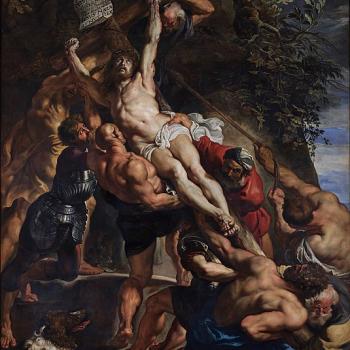So, fifty years later, God is not dead. Altizer is not dead either, hanging on at 88. Time is also hanging on, despite big drops in circulation and the competition of the internet. Mainline liberal Protestantism has also been dwindling in numbers and relevance, though you wouldn’t know that from academic religion departments.
After the jump, though, I offer a passage from the Formula of Concord, Article VIII, on the person of Christ, which discusses the death of God in a completely different way. It takes up the controversy at the time of whether we can say that “God died on the Cross.” Zwingli and others said that only the human nature of Christ suffered and died, and that we cannot ascribe such limitations to God (scriptural language to the contrary being merely a figure of speech). But Luther insisted that because of the incarnation and the communication of the attributes of Christ’s two natures, it is true that the Son of God, the second Person of the Trinity, did suffer and die. Otherwise, another human death could not help us. We can indeed say that God died on the Cross. But then He rose again.
From The Person of Christ. Article VIII. The Solid Declaration of the Formula of Concord:
On account of this personal union, which cannot be thought of nor exist without such a true communion of the natures, not the mere human nature, whose property it is to suffer and die, has suffered for the sins of the world, but the Son of God Himself truly suffered, however, according to the assumed human nature, and (in accordance with our simple Christian faith) [as our Apostles’ Creed testifies] truly died, although the divine nature can neither suffer nor die. This Dr. Luther has fully explained in his Large Confession concerning the Holy Supper in opposition to the blasphemous alloeosis of Zwingli, who taught that one nature should be taken and understood for the other, which Dr. Luther committed, as a devil’s mask, to the abyss of hell. . . .
41] And shortly afterwards [quoting Luther]: If the old weather-witch, Dame Reason, the grandmother of the alloeosis, would say, Yea, divinity cannot suffer nor die; you shall reply, That is true; yet, because in Christ divinity and humanity are one person, Scripture, on account of this personal union, ascribes also to divinity everything that happens to the humanity, and vice versa. 42] And it is so in reality; for you must certainly answer this, that the person (meaning Christ) suffers and dies. Now the person is true God; therefore it is rightly said: The Son of God suffers. For although the one part (to speak thus), namely, the divinity, does not suffer, yet the person, which is God, suffers in the other part, namely, in His humanity; for in truth God’s Son has been crucified for us, that is, the person which is God. For the person, the person, I say, was crucified according to the humanity. . . .
44] Dr. Luther says also in his book Of the Councils and the Church: We Christians must know that if God is not also in the balance, and gives the weight, we sink to the bottom with our scale. By this I mean: If it were not to be said [if these things were not true], God has died for us, but only a man, we would be lost. But if “God’s death” and “God died” lie in the scale of the balance, then He sinks down, and we rise up as a light, empty scale. But indeed He can also rise again or leap out of the scale; yet He could not sit in the scale unless He became a man like us, so that it could be said: “God died,” “God’s passion,” “God’s blood,” “God’s death.” For in His nature God cannot die; but now that God and man are united in one person, it is correctly called God’s death, when the man dies who is one thing or one person with God. Thus far Luther.
45] Hence it is manifest that it is incorrect to say or write that the above-mentioned expressions (God suffered, God died) are only praedicationes verbales (verbal assertions), that is, mere words, and that it is not so in fact. For our simple Christian faith proves that the Son of God, who became man, suffered for us, died for us and redeemed us with His blood.












